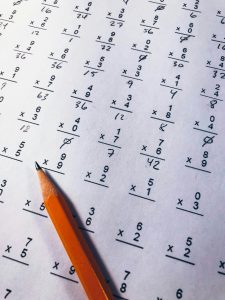Fun Math Puzzles for Kids: Engage and Build Mental Math Skills

Looking for ways to make math fun for your child? Math puzzles are a perfect way to introduce math concepts while keeping your child engaged. These puzzles not only improve mental math skills but also boost critical thinking. Let’s explore some exciting math puzzles and their benefits!
Why Math Puzzles are Essential for Your Child’s Mental Development
Math puzzles are powerful tools in early childhood education. They offer a tangible way for children to grasp abstract mathematical ideas in a playful and engaging context. By transforming complex concepts into fun challenges, math puzzles create an enjoyable learning experience that keeps children motivated and curious.
Benefits of Math Puzzles
Engagement: Brain teasers capture children’s attention, making learning enjoyable and encouraging a positive attitude toward math. They transform what might feel like tedious lessons into interactive and exciting activities that children look forward to.
Critical Thinking: These puzzles require logical reasoning, helping children analyze problems, identify patterns, and explore different strategies to arrive at a solution. This process enhances their ability to think critically and solve problems creatively.
Skill Development: Math puzzles enhance essential skills like counting, addition, subtraction, and problem-solving in a fun, interactive way. They serve as an excellent supplement to traditional learning methods, providing varied opportunities to practice these foundational skills.
Boosting Confidence: Successfully solving puzzles gives children a sense of accomplishment, reinforcing their abilities and building confidence. The challenges encourage perseverance and resilience, as children learn to view mistakes as part of the learning process.
Social Interaction: Collaborative puzzles promote teamwork, communication, and shared learning experiences. Whether working with peers or family members, these activities foster a sense of community and encourage children to learn from one another.
Incorporating math puzzles into early education not only strengthens foundational skills but also instils a lifelong love for problem-solving and exploration.
Types of Math Puzzles for Young Kids
1. Riddles and Brain Teasers
-
Example:
Riddle: I am an odd number. Take away one letter and I become even. What number am I?
Answer: Seven (remove the ‘s’ to get “even”).
2. Shape Puzzles
-
Example:
Puzzle: If you have three triangles and two squares, how many sides do you have in total?
Answer: 17 sides (Triangles: 3 x 3 = 9, Squares: 2 x 4 = 8, Total = 9 + 8).
3. Logic Puzzles
-
Example:
Puzzle: Two fathers and two sons go fishing. Each catches one fish, but they bring home only three fish. How is this possible?
Answer: There are three people: a grandfather, his son, and his grandson.
4. Number Puzzles
-
Example:
Puzzle: What is the next number in the sequence: 2, 4, 6, 8…?
Answer: 10 (pattern: adding 2).
5. Crossword Math Puzzles
-
Combine vocabulary with math concepts. For example, a clue could be: “The sum of this number and three is five.”
6. Dominoes and Board Games
-
Games like dominoes teach counting and basic arithmetic through play.
Strategies for Introducing Math Puzzles
-
Integrate Puzzles into Daily Activities
Incorporate puzzles into everyday routines, like car rides or family game nights, to make learning feel natural and effortless. These small moments create valuable opportunities for engagement without feeling like structured lessons. -
Use Technology Wisely
Leverage interactive apps and online platforms that offer engaging math puzzles tailored to young learners. Many of these tools adapt to a child’s skill level, making the experience both challenging and rewarding while adding a tech-savvy element to learning. -
Create a Puzzle Corner
Set up a dedicated puzzle space at home or school with rotating options to keep children interested and motivated. Including a mix of physical puzzles, worksheets, and games ensures a diverse and stimulating environment. -
Encourage Group Work
Collaborative puzzle-solving fosters teamwork and allows children to learn from their peers’ strategies. Working together not only builds social skills but also helps children approach problems from multiple perspectives. -
Celebrate Success
Recognize achievements with praise, certificates, or small rewards to boost confidence and motivation. Celebrating milestones reinforces the joy of learning and encourages children to tackle even more challenging puzzles.
By implementing these strategies, parents and educators can create an engaging and supportive environment that nurtures both mathematical skills and a love for problem-solving.
|
Strategy |
Benefits |
|---|---|
|
Daily Activities |
Reinforces math concepts in a natural way |
|
Technology |
Interactive and engaging learning experience |
|
Puzzle Corner |
Promotes independence and exploration |
|
Group Work |
Enhances collaboration and problem-solving |
|
Celebrating Success |
Builds confidence and encourages further effort |
Summing Up: Unlocking the Power of Math Puzzles
Introducing math concepts through fun puzzles is an effective strategy for engaging young learners while fostering essential skills like logical thinking, problem-solving, and collaboration.
By incorporating various types of puzzles into educational activities, parents and educators can create an enriching environment that inspires a love for mathematics from an early age.
For a structured program combining math puzzles with skill development, consider SIP Abacus. Their courses use visualization techniques and interactive tools to boost mental math abilities, concentration, and confidence in young learners.
For those wondering how to use an abacus, this ancient tool can be a fantastic way to teach children fundamental math skills through hands-on practice.
Start introducing math puzzles today and watch your child’s skills and love for learning grow!



